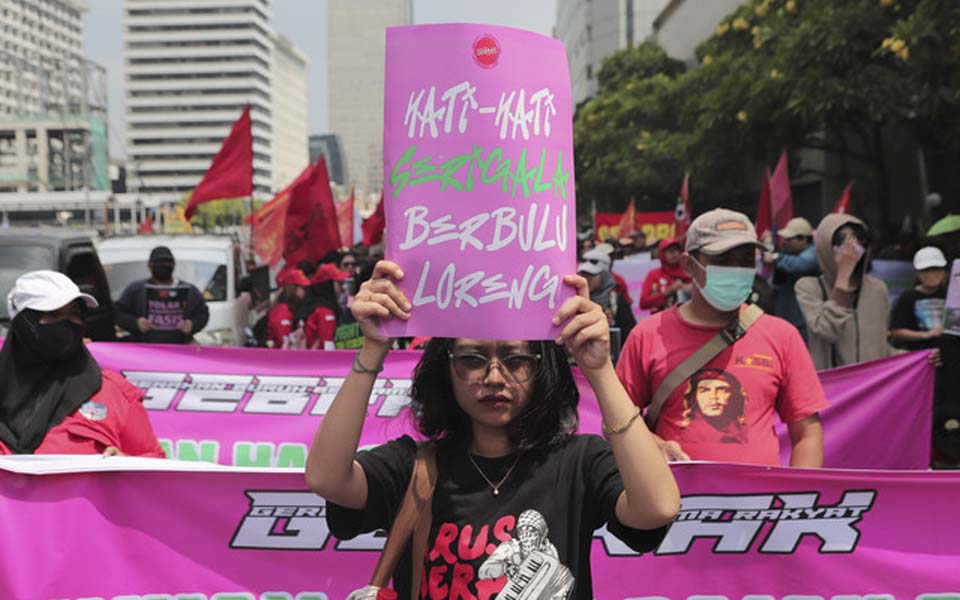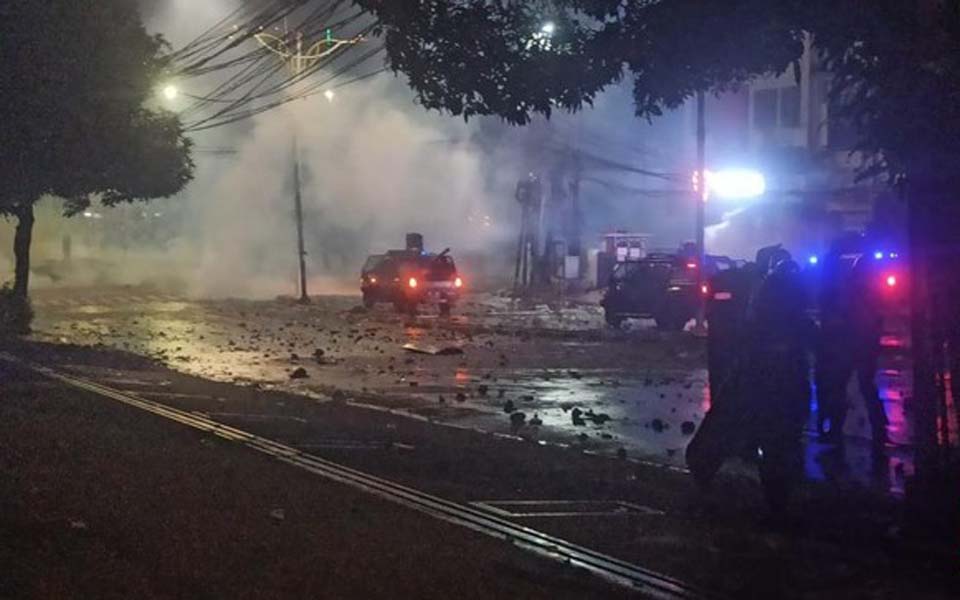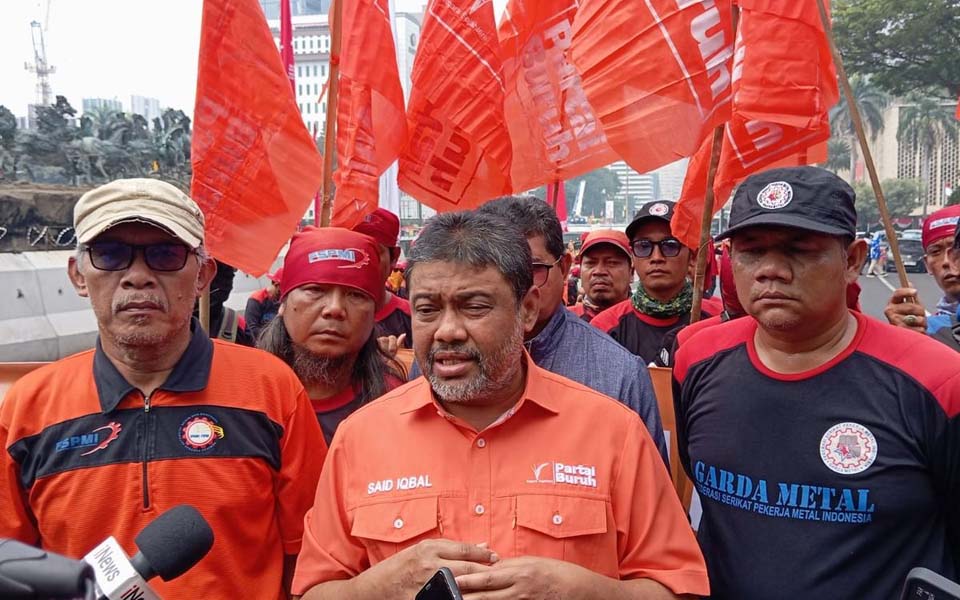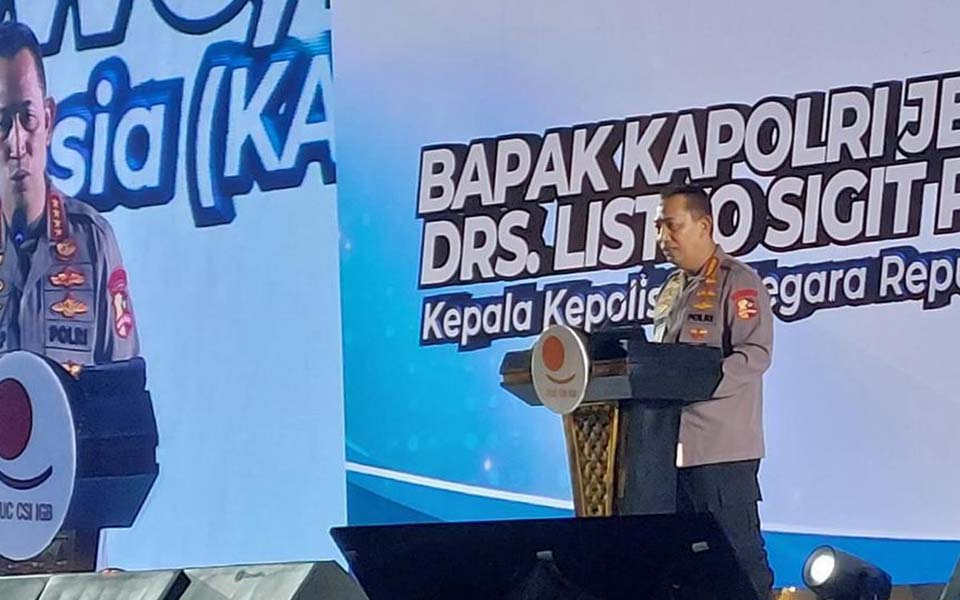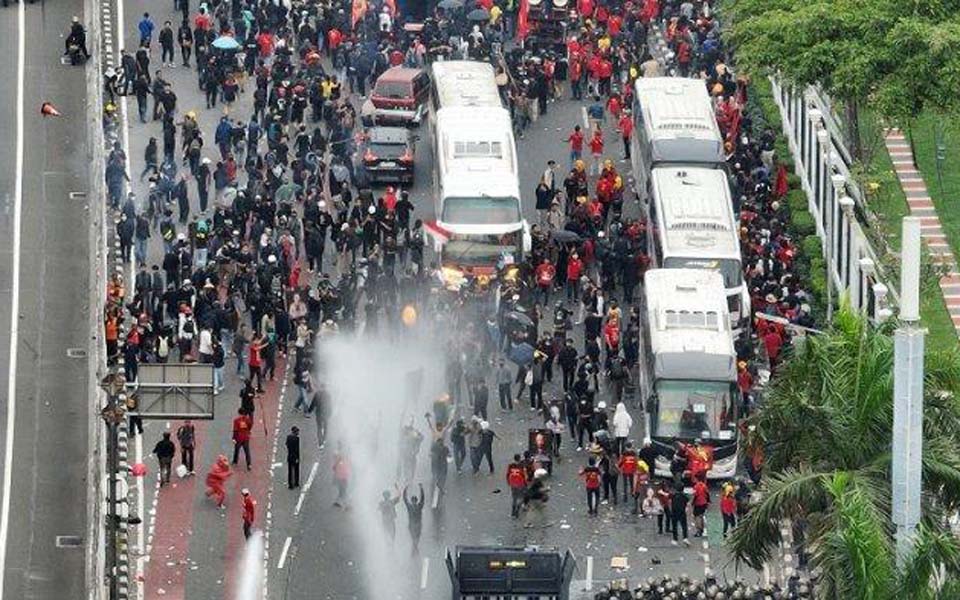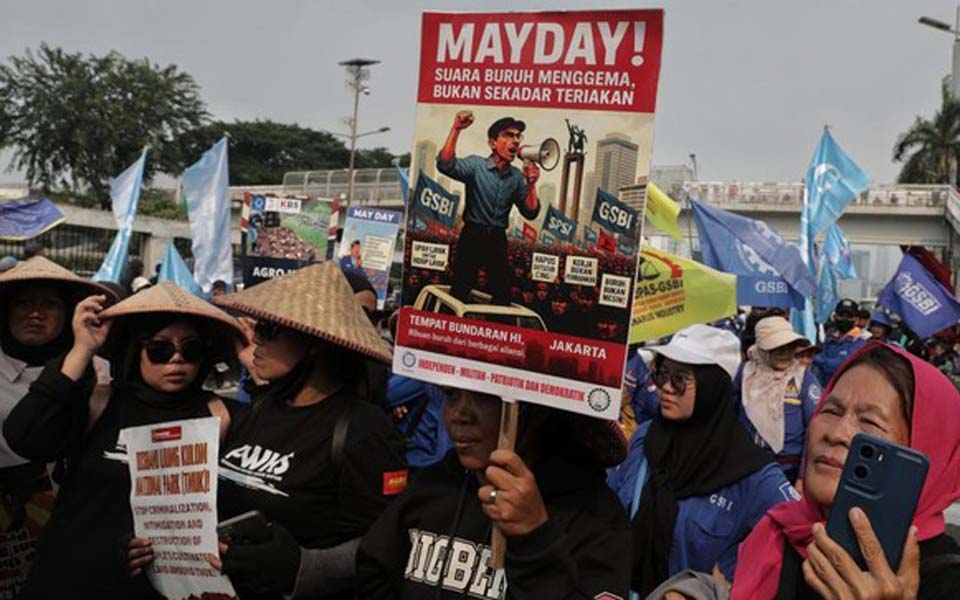May Day or Labour Day for us, the organisations that are members of GEBRAK, is a day of momentum for the workers' struggle, we must always promote it. [...] There is no reason that is adequate for people who have up until now suffered bad policies and repressive treatment from the state to then become close to and unite with oppressive power. Rather in fact, the ordinary people must build national unity between other oppressed peoples in order to achieve prosperity" – Sunarno, general chairperson of KASBI
On May Day this year, there are some interesting things that have happened, including several trade unions that will celebrate the momentum at the National Monument (Monas) in Jakarta and who have invited President Prabowo Subianto to deliver a speech in front of thousands of workers.
Some of them even compared the moment with Indonesia's founding president Sukarno who gave a speech on May Day in front of thousands of workers during the Old Order.
Yet in 2023, Prabowo himself said that workers should not demand wage increases from employers. In addition, his party, the Greater Indonesia Movement Party (Gerindra), was one of the most insistent political parties when ratifying the Omnibus Law on Job Creation, which we know has been a problem for workers.
Historically, Prabowo's attitude towards workers in Indonesia is clear, he does not care about the fate or welfare of workers; moreover in terms of political and economic interests, they are not only different but completely contradictory. So what kind of speech or oration is expected to come out of his mouth on May Day at Monas? Are they expecting him to say that he will revoke the Omnibus Law?
What the trade unions did by centring this year's May Day action at Monas while inviting Prabowo was not only wrong, but also a betrayal of the workers themselves. Distorting May Day as a momentum of resistance into a day for workers to dig their own graves.
Furthermore, the trade unions' hype that they will mobilise hundreds of thousands of their members to rally at Monas was used as justification by the police to block May Day celebrations elsewhere in Jakarta on the grounds of traffic concerns. This was experienced by members of the Labour Movement with the People (GEBRAK) alliance from areas outside of Greater Jakarta (Jabodetabek), where they were blocked by police and bus companies intimidated so they would not transport them to Jakarta.
During the momentum of May Day, trade unions should spearhead the people's struggle which must take a stand against power. Starting with labour issue themselves, then the decline of democracy, National Strategic Projects (PSN) and so on, things that have been caused by the government, and of course this includes Prabowo himself.
Courtesies in the president's speech at the May Day event celebrated with workers will not change anything. Why, because his policies of deregulation (read investment climate effectiveness) and incentives for employers instead of workers are the very opposite of efforts to improve workers' welfare. Various normative labour issues are still a spectre in workers' daily lives, problems of job security, job safety, decent jobs and guarantees of employment in the face of rapid technological changes. The state only sees the side of the employers, who need to ensure investment health rather than workers who are threatened by poor working conditions.
Workers in the labour flexibility roundabout
Since the Omnibus Law was passed in 2021, instead of creating many jobs the law has actually moved the opposite way. The spirit of easy hiring easy firing it legalised has created a flexible labour system. In addition to there being no restrictions on the types of work that can be outsourced and changes to the contract work scheme, the Omnibus Law also made workers vulnerable to being laid off (PHK).
Labour flexibility has proven to be detrimental to workers. Uncertain economic and political grounds are often used to sacrifice workers to save businesses. Over the decades various issues ranging from the cessation of production chain supplies, trade wars and global increases in the cost of energy (oil and gas) have often been used as reasons for companies to lay off workers. Textile and garment workers for example have been laid off for these reasons.
Most recently, many layoffs were carried out during Ramadan 1446 H. On the first day of the fasting month on March 1, the giant textile company PT Sri Rejeki Isman (Sritex) closed down completely after being unable to pay debts amounting to 26 trillion rupiah. The closure of the company (which experienced the first labour strike under the Suharto regime in 1995 in which missing labour activist Wiji Thukul's lost the retina of his right eye) resulted in 12 thousand of its workers being laid off.
In Garut, West Java, PT Danbi International laid off 2,000 workers on the grounds that the company did not receive any orders so that the delivery of goods abroad was reduced. In Cimahi, also in West Java, hundreds of workers were laid off after PT Bapintri claimed to have suffered financial losses. Worse, the company will only give severance pay to its workers in instalments over four-and-a-half years.
The number of workers sacked during Ramadan adds to the 18,610 workers laid off in January and February. The rise in cases of layoffs is an impact of work flexibility regulated under the Omnibus Law and its derivative regulations.
Under Article 36 letter b of Government Regulation Number 35/2021 on Temporary Employment Contracts, Outsourcing, Working Hours, Employment, Rest Periods and Termination of Employment, it states that layoffs are allowed when "A company is conducting efficient measures followed by the closure of the company or not followed by the closure of the company which is caused by the company suffering a loss".
In addition to this, Article 44 of the regulation states that efficiency (layoffs in a refined language) conducted by the company can be based on the potential decrease in company productivity. On that basis, employers can easily sacrifice workers to save their companies. Plus the loss and decrease in productivity does not have to be audited by the Department of Labour.
In the midst of the storm of layoffs and formal jobs that are increasingly difficult to obtain, informal work is the instant solution offered by the government. The gig economy that creates an online-based job, does not in fact place workers in a decent zone of life.
For example, motorcycle taxi (ojol) drivers, who are faced with a pseudo partnership status. The status of the partner in the employment relationship is regulated Under Law Number 20/2008 on Micro Small and Medium Enterprises. This status requires both parties to have equal rights, be mutually beneficial and needed, and no one controls the other party.
The partnership status however is pseudo, because the platform company always has more control over the driver. In research in the book "Questioning Decent and Fair Work in the Gig Economy in Indonesia", three ojol companies, namely Gojek, Grab and Maxim, were found not to meet a "fair" work criterion, namely: payment according to the minimum wage, fair working conditions, fair work contracts and fair management.
This situation has given rise to the desire of the ojol drivers to be given the status as formal workers. A survey in 2020 showed that total of 53.1 percent of ojol drivers agreed with switching status from partners to formal workers, and that this desire increased four years later to 58 percent.
The struggle for formal worker status is reflected in the demands for holiday bonuses (THR) by ojol drivers. The struggle resulted in the issuance of a Labour Minister circular on "Giving Religious Bonuses (BHR) in 2025 for Drivers and Couriers on Application-Based Services". In the circular, the ojol drivers was given a BHR of 20 percent of the average income per month over the past 12 months, far short of the demand for 100 percent.
Another types of work that do not have welfare guarantees are freelance workers. The illusion that they can work anywhere and anytime results in freelance workers experiencing excessive exploitation, such as long working hours, wages under the minimum wage, no work protection, no guarantee of work security to difficulties in forming trade unions. This certainly impacts on the future of freelance workers whose number has now reached some 41.6 million people in Indonesia.
This climate of labour flexibility, in addition to resulting in economic losses and work uncertainty, also impacts on the increasingly decentralised labour movement. One of the reasons for this is the Omnibus Law which delegates its regulations to be discussed in work agreements, company regulations and joint work agreements, making the struggle of trade unions indirectly compartmentalised.
Workers' solidarity that began to weaken after the Covid-19 pandemic meant that actions such as national strikes, factory and regional actions being rarely carried out. On the one hand, trade unions have strived so the Omnibus Law could not be fully applied in companies through negotiations. The power of trade unions however also varies in each company, especially for freelance and gig workers who are only just seeding the awareness of trade unions.
The challenges faced by trade union are also contained in the revisions to the Indonesian Military (TNI) Law that was passed suddenly on March 20. This is because under the revisions the TNI can play a role in handling labour strikes through military operations other than war (OMSP). This has aroused people's collective memory of military repression such as the handling of a strike in Sidoarjo in 1993 which resulted in the murder of labour activists Marsinah.
Sowing hope
The coming period will not be any easier, with economic threats to each worker, the threat of changes in technology and the threat of repression to the threat of shrinking democratic space, the symptoms of which are already visible. It can however be overcome if we join together. Solidarity in fighting is the motivation needed to share hopes for the struggle in the future. This was once done when facing Covid-19, workers along with other people's movements managed to share with each other in order to survive the difficulties of that time.
Labour unity in fighting for rights is an action that makes sense at this time. Placing hope in government "kindness" will only add to a sense of hopelessness. Nevertheless, it is still worth making demands of the state and struggling to ensure the interests of workers are the basis of policy making. It takes a big idea and action to reclaim a greater victory than this is bigger than celebrating with President Prabowo at Monas.
Fundamental changes in the political and economic situation are not only a momentum for those in power and businesses to gain profits. But are also the starting point of change for the labour movement to wage a class struggle can be achieved. By perfecting actions, more than just demands for improving the Labour Law can be won. The bargaining power of workers which has been dwindling can also be restored so that those in power and employers can no longer treat workers arbitrarily. Wins in various regions need to be celebrated and become an encouragement that change is still possible.
The struggle of workers at the regional level is a point of fire that slowly spreads through burning straw. Such as the victory of the Progressive Prosperity Trade Union (SBPS) in Klaten, Central Java, in the face of the threat of layoffs and muzzling the union. The Indonesian Workers Federation of Struggle (FPBI) victory against PT Kyowa in negotiations over the collective labour agreement that was able to dispel the Omnibus Law in the work agreement.
The victory of the FPBI's struggle against the sacking of the union management at PT Sintertech. The formation of campus trade unions, including at the Gajah Mada University (UGM) and many other campuses. Awareness of the formation of the trade union in non-government organisations (NGOs). The awareness of film workers to associate and advocate for work time restrictions and the growth of labour unions outside the manufacturing sector.
In addition to the struggle in the employment environment, workers are also involved in solidarity actions fighting for the right to jobs in Bekasi regency, participating in the struggle of indigenous peoples in Kalimantan and for government contract workers – the KB supervisor by KASBI. This needs to be appreciated as part of the spirit of a working class struggle that does not just fight for the normative rights of employment.
Sharing the spirit of victory needs to be proclaimed, providing a common space for mutual input and shared enthusiasm. This needs to be done by workers from the grassroots level or between regions as an effort to maintain mutual enthusiasm and to share hope. Solidarity between workers must be the basis for the working class to overthrow the dominance of the trade union elite who collude with the rulers and employers.
The unity of the working class with other marginalised community groups – farm workers, students, indigenous peoples and others – is expressed in a consolidation of ideas. This consolidation is used to share experiences, common struggles and reflect on differences in a space to share these forms of hope and fill counter narratives from industrial areas, villages, agricultural land, campuses and the regions to sow a shared hope.
May Day 2025 is a shared momentum to sow hope for change in the future. The world has changed a lot from two decades ago, so the dream of change that was sown at that time must be surpassed by ideas and the power of growth with the concept of building a just, prosperous, democratic and participatory society.
[Translated by James Balowski. The original title of the article was "May Day 2025: Satu Mimpi, Satu Barisan, Menyemai Harapan".]
Source: https://kprina.org/may-day-2025-satu-mimpi-satu-barisan-menyemai-harapan/









